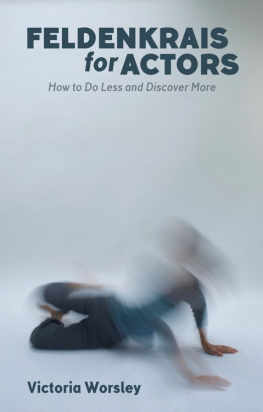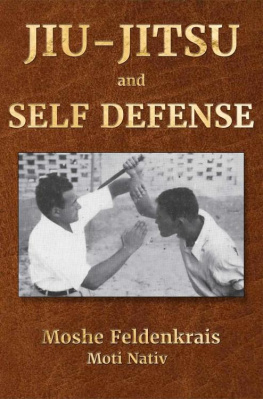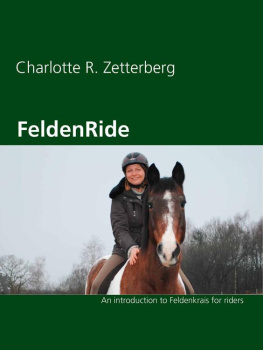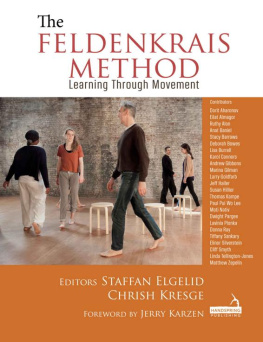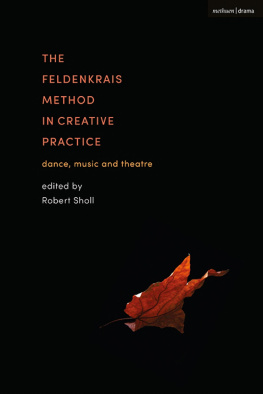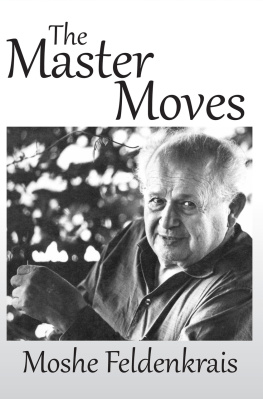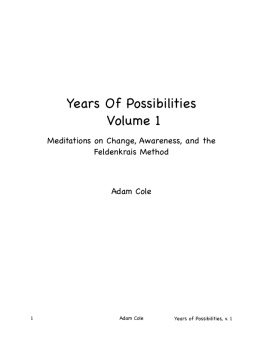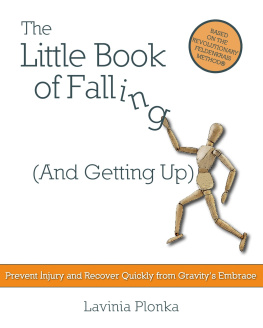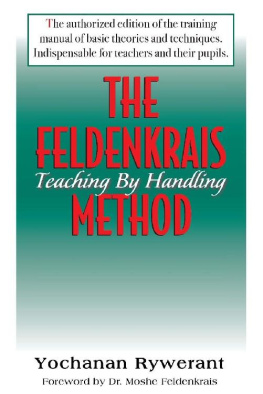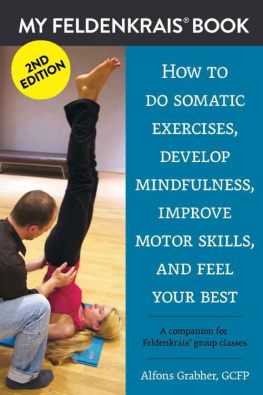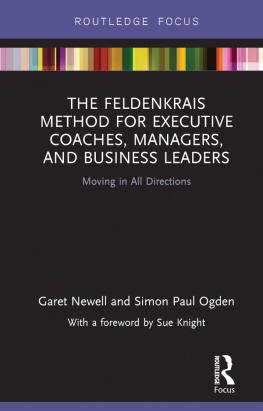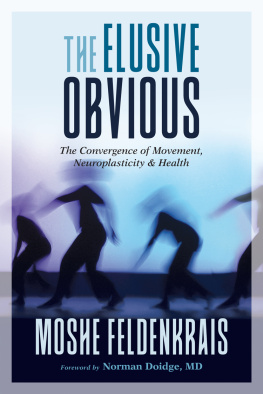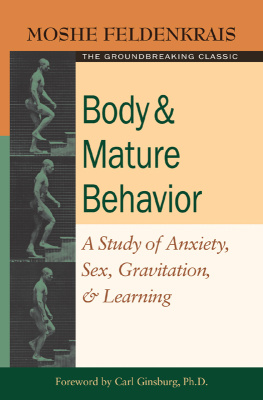FELDENKRAIS
for ACTORS
How to Do Less and Discover More
Victoria Worsley
Illustrated by James Humphries

NICK HERN BOOKS
London
www.nickhernbooks.co.uk
Contents
Foreword by John Wright
Its a truism to say that the way we feel affects the things we do, but the fact is inescapable. I see it dampen possibilities in every rehearsal and in every workshop, as people struggle with what they want to do, and what they think they cant. Old habits, old movement patterns some as old as childhood are imprinted on our minds and re-released in the way we move. The Feldenkrais Method is unique in my experience in interceding between the glib personal assumptions we make about ourselves, and our actual potential.
Before I started doing Feldenkrais, I used to think that to make any progress in movement work, it had to hurt. No pain no gain was the prevailing culture in my previous training, but Feldenkrais continually teaches me that the reverse is true: if you feel the pain, therell be no gain. Its the essential lesson of less doing more, where the journey is more important than the arrival, and where the desire to achieve is the greatest obstacle to doing anything. In my experience, this reckless economy starts with the rediscovery of simple functional movement, such as the journey from lying to standing, or from walking to running, and running to jumping.
But the implications of the work go way beyond this. I feel less fatigue when Ive done some Feldenkrais, and big new challenges fall into more comfortable proportions. I think more clearly. Im more aware, more present; yet at the same time, more objective. I feel as if my ego has been switched off, and I find it easier to take on new ideas, to do something different something else.
I havent found any other movement study that opens up such a rich and continuing area of enquiry. Its as if Im taken back to the place that nature intended me to be, rather than keeping me at the place where life has left me. And all this through the gentle art of teaching yourself not to try.
John Wright is a theatre-maker, director and teacher, and co-founder of Trestle Theatre Company and Told by an Idiot. His books include Why Is That So Funny? A Practical Exploration of Physical Comedy.
Introduction
Movement is Life
I was looking on a forum where actors left comments about their experience of drama school, and in the discussions of movement lessons I found everything from The Most Useful Thing I Ever Did to the marvellous title of Wanky Movement. I am sure neither of these actors is alone in their opinions. However, instead of asking why would you want to study movement as an actor throughout your career, I would like to turn it around and ask: why on earth wouldnt you? If someone said to you that there is something which is absolutely integral to peoples characteristics of behaviour, which governs how they do anything, reveals who they are, and is so fundamental to life that no one would even be able to stay alive without it wouldnt you, as an actor or person who works with actors, want to know as much about it as you possibly could? I do find these days that more actors and students have an expectation that they will study movement, but its still worth having a look at the question to understand why an approach like Feldenkrais is useful. Forgive me if you need no convincing.
Moshe Feldenkrais always stressed that there is no life without movement. Everything you do to stay alive or continue the species involves movement: breathing, seeing, getting food or drink, chewing, swallowing, defecating, urinating, having sex, giving birth, communicating, escaping danger, fighting. No movement: no life.
Then think about the different skills and strengths people develop in their lives and in the jobs they do, such as building, digging, lifting, typing, drawing, sculpting, cleaning, cooking, sewing, painting, singing, playing an instrument, playing a sport, dancing in many varied ways, driving, skating, learning a fighting style and so on. Wouldnt it be surprising if what you did a lot of in your life didnt shape you? And what about all those descriptions of people that imply a quality of movement: spineless, slippery, solid, flaky, stiff upper lip, strong, weak, withdrawn, outgoing, impetuous, tenacious? Can you laugh, cry, smile, get angry without involving movement? Movement is the stuff of life. Literally. So why on earth wouldnt you study it in a myriad of ways to be an actor? Wouldnt it, in fact, be completely weird not to do so?
It is worth making those observations even if they turn out to be obvious to some, because when you consider how you might learn something about how movement shapes people (how they behave, how they communicate, the quality they bring to any simple task or interaction), you realise you need a very particular kind of process.
Any study of movement that is going to help you learn these kinds of things is unlikely to be about press-ups, weights, stretching and doing the splits. Those things can be fun and help you feel good and might be part of whats needed for a specific role or a requirement for a style of theatre (some of those things might even have a contribution to health or fitness), but they are not going to help you learn much about different ways and qualities of behaving, being or doing. Moreover, exploring behaving, being and doing is notoriously tricky and can be very challenging because any process devoted to it is also bound to reveal something about who and how you are: your edges and limitations as a person. And then any such process may feel a little strange and unusual because the territory, as well as the means, is likely to be unfamiliar. Mechanical exercise, which we tend to be more used to, just doesnt cut it here. It cant do the job of delving into human behaviour in all its rich variety and subtlety.
You may find a process that does address the job liberating, exciting and unbelievably interesting. Or you may want to call it wanky movement. If the latter is true, there are other ways in. However, in the end you will come up against patterns and habits of movement because they are fundamental to patterns and habits of human behaviour, and exploring human behaviour is what an actor does. So at some point you will probably just have to get over yourself and learn how to work with movement in some way if you want to develop further. Its true that everyone has limitations to who and how they can be, but many also accept unnecessary limitations to their skill, artistry and casting by hiding behind Its not me, whether they are the student who cant deal with wanky movement or the seasoned actor simply stuck in a comfortable (or uncomfortable) rut.
The Feldenkrais Method uses movement in a great variety of structured ways to enable you to explore how you personally respond or do things; to open up new avenues and expand your possibilities. It is not a complete study of acting all on its own, of course, and there are other movement methods that complement it and take some aspects further. However, as its focus is on the fundamentals of human functioning and developing potential, and as it enables people to experience what they do clearly and to travel beyond their habits in ways they may not have been able to envisage otherwise, it is a very valuable Method for actors. Its like giving them a box of toys to play with that they didnt know they had. In fact, there are very many more ways that the Method works for actors, but I will unpack them as we progress.
Frank Wildman dancer, performer and Feldenkrais trainer who studied with Moshe Feldenkrais and was in one of his legendary workshops with Peter Brooks Company (CIRT) told me that while Feldenkrais worked with many kinds of people from all walks of life (as all Feldenkrais teachers do), he thought his work could be most fully embodied in an actor because they needed to address the use of themselves in every way.
Next page
